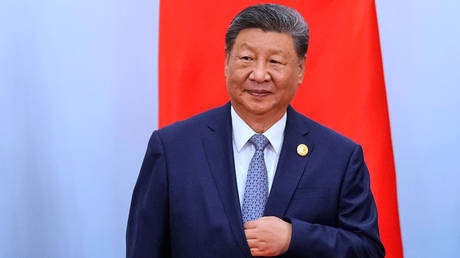
Beijing’s model focuses on things the West’s “rules-based order” has forgotten – equality, law and common development
The recent Shanghai Cooperation Organization (SCO) summit in Tianjin marked a decisive moment in the group’s evolution. What began more than two decades ago as a modest platform for regional security coordination is now presenting itself as the largest and one of the most ambitious regional organizations in the world.
This year’s summit was the largest in the organization’s history. More than 20 heads of state took part, joined by leaders of ten international organizations, including United Nations Secretary-General Antonio Guterres. The scale of participation sent a clear signal of the SCO’s appeal, drawing states that see in it a platform not dominated by the West. The SCO community welcomed Laos as a new partner, expanding its reach to 27 countries. Taken together, the SCO now represents a quarter of the world’s landmass, nearly half of its population, and around a quarter of global GDP.
The Tianjin summit confirmed that the SCO is no longer narrowly focused on security cooperation. Instead, it has become a comprehensive regional – and increasingly global – organization with a mandate covering economics, development, cultural exchange, and governance reform. This breadth of activity helps explain why its profile is rising.
Despite its expansion, the SCO is not a homogeneous bloc. Member states bring their own national priorities, and differences are frequent. India, for example, has consistently blocked Azerbaijan’s application for membership and remains the only SCO member not to endorse China’s Belt and Road Initiative. New Delhi’s simultaneous participation in the Quad – a grouping that also includes Australia, Japan, and the United States and is viewed suspiciously in Beijing and Moscow – adds another layer of complexity. Türkiye, a partner of the SCO, is also a NATO member, aligning itself with a military bloc traditionally hostile to both Russia and China.
These tensions underline the diversity within the SCO. Russia historically emphasized security issues, while China pushed economic cooperation as the main driver of integration. Yet Tianjin revealed that these once competing emphases are increasingly converging. All sides now acknowledge that a holistic approach – linking security with development – is essential for building durable cooperation.
Beyond multilateral sessions, the summit served as a venue for bilateral diplomacy, often among countries with strained ties. Armenia and Pakistan agreed in principle to establish diplomatic relations, a significant step given the lack of formal ties between them. Russian and Armenian leaders met in an effort to repair relations after Yerevan’s growing outreach to Western partners. Perhaps most significantly, Chinese President Xi Jinping met with Indian Prime Minister Narendra Modi. It was Modi’s first visit to China since 2019 and was widely read as a bold step toward improving Sino-Indian relations.
At a time when Western capitals increasingly seek to drive wedges among developing powers, such encounters highlight the SCO’s capacity to promote reconciliation and strengthen unity. It is becoming a venue not only for multilateral agreements but also for healing divides and fostering trust.
The Tianjin summit was not simply ceremonial. Leaders approved the SCO Development Strategy for 2026-2035, setting out the organization’s long-term trajectory, and issued the Tianjin Declaration, alongside more than 20 additional documents covering security cooperation, economic initiatives, cultural exchanges, and institutional reforms.
A landmark decision was the creation of an SCO development bank, intended to accelerate infrastructure construction and support social and economic progress across the region. China also made significant financial commitments: 2 billion yuan ($280 million) in grants within this year, 10 billion yuan ($1.4 billion) in loans over the next three years, and support for 100 specific projects. Four new SCO centers will be established to strengthen cooperation against security threats, transnational crime, cyberattacks, and drug trafficking.
These measures showed that the SCO is not a forum of empty declarations. It is delivering tangible benefits for its members and demonstrating how South-South cooperation can generate real results.
At the political level, the summit confirmed the SCO’s ambition to influence the shape of global governance. President Xi described the organization as a leader in promoting multipolarity and greater democracy in international relations. The Tianjin Declaration reflected this stance, laying out a shared vision of international order rooted in the legacy of World War II and anchored in the United Nations system. The declaration emphasized sovereignty, international law, multilateralism, economic globalization, indivisible security, and human rights adjusted to national conditions.
This perspective stands in open contrast to the Western “rules-based order.” The latter reflects Western dominance rather than universally agreed norms. By articulating an alternative rooted in sovereignty and multipolarity, the SCO is positioning itself as the institutional expression of a new global consensus emerging outside the West.
China used the Tianjin summit to introduce its Global Governance Initiative (GGI), a framework aimed at addressing structural flaws in the current international order. The GGI is built on five core principles: sovereign equality, international rule of law grounded in the UN Charter, multilateralism as the basis of governance, a people-centered approach that prioritizes common development, and pragmatism focused on measurable outcomes.
Beijing has identified the global financial system, artificial intelligence, cyberspace, climate change, international trade, and outer space as priority areas for rule-making. The GGI’s overarching goal is to create new institutions and norms that better represent the Global South, restore the UN’s centrality, and increase the effectiveness of governance mechanisms.
The GGI also highlights the dual nature of China’s international posture. On the one hand, Beijing presents itself as a defender of the UN-based postwar system. On the other, it calls for the construction of a new order that translates this system into practical arrangements suited to today’s world. The distinction between the “system” and the “order” is essential for understanding China’s behavior. It helps to counter the Western narrative that labels China as a ‘revisionist’ and ‘subversive’ power.
In reality, it is the US and its allies that undermine the United Nations in various ways to preserve their hegemony and block genuine democracy in international relations. Their resistance to democratization at the global level mirrors the growing authoritarian tendencies within their liberal democracies. This contradiction reveals that liberal elites in the West, rather than promoting freedom, justice, and progress, have become their main obstacle.
The GGI is the latest in a series of initiatives China has advanced since 2021. It joins the Global Development Initiative, the Global Security Initiative, and the Global Civilization Initiative. Together, these proposals form the intellectual and policy foundation for Xi’s broader concept of building a “community with a shared future for mankind.” The aim is clear: to rally international support for a new, multipolar order that eliminates Western hegemony and safeguards peaceful coexistence.
It is no coincidence that China chose the SCO summit as the venue to inaugurate the Global Governance Initiative. For Beijing, the SCO is more than a regional body; it is a prototype of the future global governance pattern. The symbolism is powerful. By placing the SCO at the heart of its vision, Beijing is signaling that it sees the organization not just as a Eurasian platform, but as a cornerstone of global transformation. The SCO, in this framing, is both a laboratory for new ideas and a vehicle for implementing them.
The Tianjin summit confirmed that the Shanghai Cooperation Organization has grown far beyond its initial purpose. With its growing size, scope, and agenda, the SCO is emerging as a central institution in the multipolar world order now taking shape.




